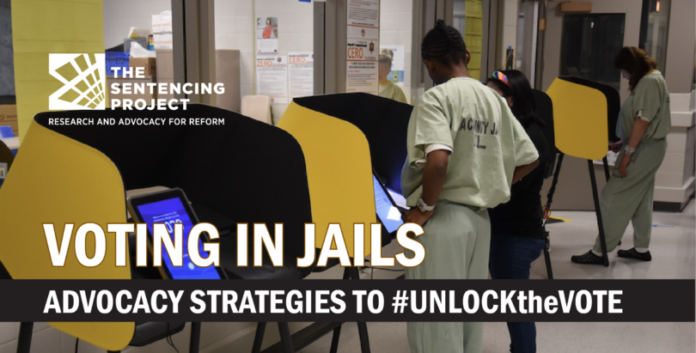
By Stacy M. Brown, Senior National Correspondent, NNPA Newswire
According to a report from The Sentencing Project, current jail-based voter programs that rely on absentee voting often experience various logistical challenges.
Increasingly, advocates and officials recognize that establishing a polling location will improve voter access and turnout far better than jail-based absentee voting initiatives.
Sentencing Project researchers pointed to when after the Cook County jail in Illinois was turned into a polling location, approximately 2,200 people were able to cast their ballot.
“Every year, hundreds of thousands of eligible incarcerated voters are unable to cast their ballot due to misinformation, institutional bureaucracy, and de-prioritization among government officials,” said Durrel Douglas, author of the report, and Jail-based Voting Initiative Organizer with The Sentencing Project.
“This [report] provides many case studies that can help advocates increase ballot access for incarcerated voters and help jail officials and lawmakers expand ballot access in jails,” Douglas stated.
“Our democracy works best when everyone eligible to vote can make their voice heard.”
Researchers observed that the vast majority of those incarcerated are eligible to vote because they are not currently serving a sentence for a felony conviction but are incarcerated pretrial or sentenced to a misdemeanor offense.
However, incarcerated voters often experience significant barriers to voting because of misinformation, the institutional bureaucracy that varies from one county or city to another, and de-prioritization among government officials, the researchers concluded.
They said most states have underdeveloped practices for people incarcerated in prisons and jails to register or access absentee ballots or polling locations.
Further, the report noted that many incarcerated residents could not freely communicate via phone or email with election officials to monitor their voter registration or ballot applications.
The authors insisted that voter education for justice-impacted citizens is often limited and varies across states, resulting in too many Americans being left behind each election season.
They said recent reforms and a growing civic infrastructure offer opportunities to strengthen voting access and ensure the franchise for every individual, regardless of incarceration status.
“We, as an organization, would hope that every jail would either support a polling location in their facility in partnership with the local Board of Elections and or enable and support absentee voting systems,” Kristen Powers, executive director of the Benevolence Farm.
This rural North Carolina nonprofit supports formerly incarcerated women by providing housing, employment, and wraparound services.
Benevolence Farm also co-operates a Bail Fund that serves individuals incarcerated in the local detention center on low-level bonds of up to $2,000.
“Elected officials and the policies they implement affect incarcerated people every day. Incarcerated people are most proximate to the problem and, thus, should have input on the solution,” Powers wrote in an email.
“Furthermore, they are taxpayers, and we firmly believe there should be no taxation without representation for all people in our country.”
The Sentencing Project researchers said lawmakers and citizens could work with political candidates to host candidate forums at local jails.
During the 2021 election cycle in Michigan, Genesee County Sheriff Chris Swanson and the IGNITE – Inmate Growth Naturally and Intentionally Through Education – program co-hosted a candidates’ forum for residents at the jail. More than 20 city council candidates attended the “Meet the Candidates’’ town hall, where residents at the prison and candidates discussed ways to improve public education and support reentry programs.
According to the Sentencing Project’s report, America’s mass incarceration problem has led to record levels of disenfranchisement.
However, researchers found that many justice-impacted residents, including those in pretrial jail detention, incarcerated in certain states on a probation or parole violation, or sentenced for a misdemeanor, are eligible to vote while in jail.
“Yet even when the law permits certain individuals to vote while incarcerated, many remain unable to vote because of obstacles to electoral participation, including lack of polling places and an inability to register to vote,” researchers wrote.
They noted that individuals in jail are also often reluctant to exercise the franchise due to fear and lack of awareness.
Democracy advocates and stakeholders must include incarcerated voters in their democracy initiatives to improve voting in jail practices.
“With the end of felony disenfranchisement in Washington, DC, and the introduction of similar measures to expand voting to all persons with felony convictions in other states, building the infrastructure for democratic participation in local jails not only expands voter access to strengthen our democracy, it can also help guarantee ballot access for all incarcerated citizens in the United States,” the researchers asserted.



